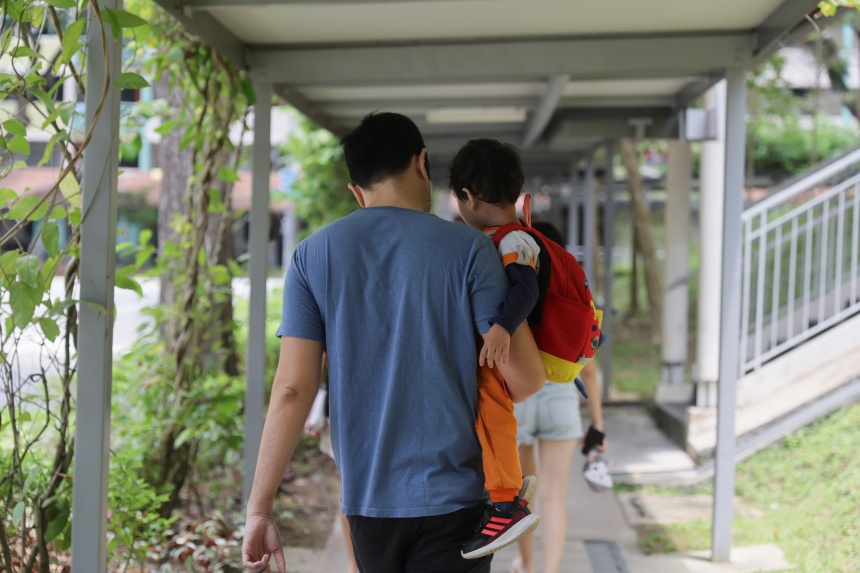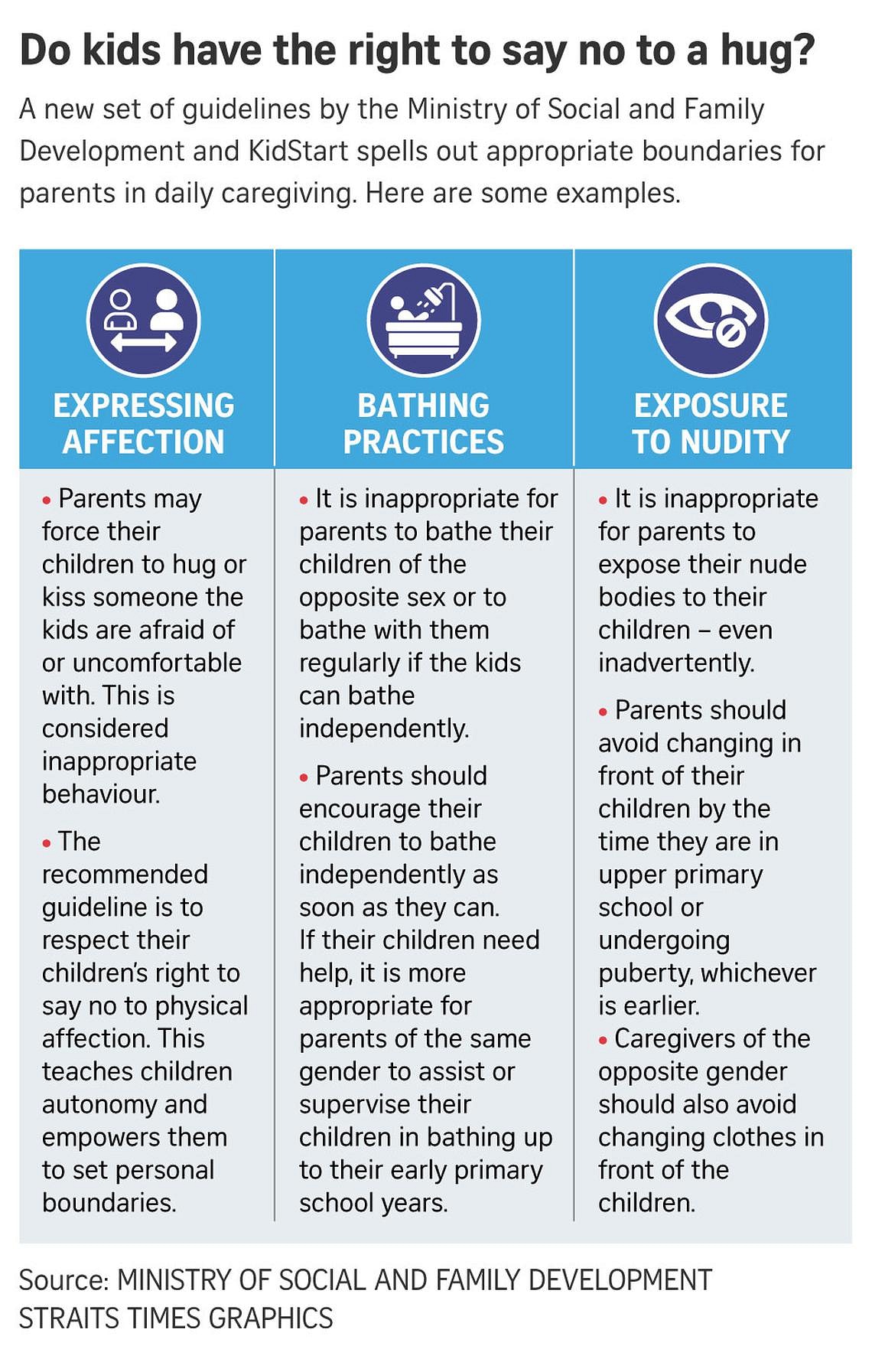New MSF guidelines for appropriate caregiving boundaries between parents and children


SINGAPORE - It is inappropriate for parents to bathe their child of the opposite gender regularly when he or she can do so independently.
This is in a new set of guidelines by the Ministry of Social and Family Development (MSF) and KidStart spelling out appropriate boundaries in daily caregiving between parents and children in areas such as expressing affection, privacy and toileting.
For instance, forcing a child to show physical affection to someone he or she is uncomfortable with is also deemed inappropriate.
The authorities came up with the “guidelines on healthy family boundaries” as a tool for professionals in the early childhood, education, social service and healthcare sectors, to coach parents on setting healthy boundaries and practices.
KidStart, a non-profit organisation, specialises in supporting families in early childhood development.
According to a presentation by MSF staff at the Asian Family Conference in November, this is the first practitioners’ guide in Singapore providing clear recommendations on healthy family boundaries.
Minister of State for Social and Family Development Sun Xueling announced the guidelines on Nov 7 at the conference.
Ms Yogeswari Munisamy, senior principal social worker at the MSF’s Child Protective Service, told The Straits Times that a concern is that inappropriate boundaries within families can, in some cases, escalate into abusive behaviour over time.
“The Child Protective Service recognises this risk based on the cases they encounter. When family boundaries become blurred – often unintentionally – it can create situations where children are vulnerable to harm,” she said.
Research has shown that violations of such boundaries can lead to confusion and distress for the child, which may normalise inappropriate behaviour and increase the risk of abuse, she added.
The guidelines come in the wake of the rising number of child abuse cases, as detailed in the Domestic Violence Trends report released by MSF in September.
The number of new Tier 1 child abuse cases, defined as those with low to moderate safety and risk concerns, rose 17 per cent from 2,377 in 2021 to 2,787 in 2023.
However, the number of new Tier 2, or high-risk, cases fell slightly from 2,141 in 2021 to 2,011 in 2023.
Some examples of the guidelines on healthy boundaries are:
- Expression of affection
It is inappropriate for parents to force their child to hug or kiss someone the child is fearful of or uncomfortable with.
Instead, respect the child’s right to say “no” to physical affection. This teaches children autonomy and empowers them to set personal boundaries.
- Bathing practices
It is inappropriate for parents to bathe their child of the opposite gender or bathe together with their child regularly if the child can bathe independently.
Encourage the child to bathe independently as soon as he or she can. If the child requires help, it is more appropriate for a parent of the same gender to assist or supervise the child, until his or her early primary school years.
- Exposure to nudity
It is considered inappropriate behaviour for parents to expose their nude bodies to their children, even inadvertently.
Parents should avoid changing in front of their children by the time the child is in upper primary school or puberty, whichever is earlier. Caregivers of the opposite gender should also avoid changing clothes in front of their child.
Ms Yogeswari said: “The guidelines are meant for professionals to use with all parents as part of a broader preventive effort to support positive child outcomes.
“However, their application is tailored to each family’s unique circumstances, such as the child’s age and developmental needs, ensuring they are relevant and practical for a diverse range of parenting situations.”
Ms Yogeswari cited some examples the Child Protective Service has come across where boundaries were unintentionally violated.

For example, a parent may consistently pressure the child to hug or kiss someone despite the fact that the child is clearly uncomfortable doing so.
Ms Yogeswari added: “While this may initially seem minor, it can condition the child to minimise the way they feel in threatening or risky situations, making them more susceptible to harm in other contexts.”
Ms Nawal Adam Koay, assistant director at the Singapore Children’s Society, said she has encountered boundaries being crossed within families in her line of work.
This includes adolescents sleeping on the same bed as their adult caregivers or children accidentally seeing their parents’ sexual interactions due to “limited living spaces”, she said.
Ms Tan Yi Lin, centre lead of Pre-School By-The-Park, said parents are often unsure about when they should stop bathing their child of the opposite gender or when to stop bathing with their child. Such practices are often done out of convenience or a lack of awareness of privacy boundaries, she said.
Ms Nawal said: “As parenting practices and family norms are still considered private and domestic affairs, having specific guidelines on what is considered inappropriate behaviour for caregivers is very helpful.
“These guidelines serve as useful conversation starters for professionals when engaging parents and caregivers about safe and healthy boundaries while helping their children build independent living skills.”
Ms Tan added that the red flags in the guidelines help professionals identify potential risk or concerning behaviour, and serve as a “vital tool for intervention and prevention”.
Mr Darius Lee, 36, who has a two-year-old son and a newborn daughter, said the guidelines are a good reminder of the boundaries he has to respect in his interactions with his children.
For the guidelines to be effectively implemented, parents also have to feel that their views and practices are being respected, he said.
Mr Lee, the executive director of non-profit organisation Cultivate SG, said: “Some people may feel judged about their parenting practices. So, there is a need to be sensitive and respectful in imparting the guidelines to the target audience.”
Get the ST Smart Parenting newsletter for expert advice. Visit the microsite for more.





No comments:
Post a Comment